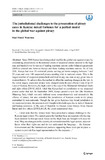| dc.description.abstract | Since 2008 Kenya has distinguished itself in the global war against piracy by undertaking prosecutions in the national courts of suspected pirates arrested in the high seas and handed over by navies of leading maritime nations under bilateral agreements (MOUs) entered into between Kenya and these leading maritime nations. As of July 2011, Kenya had over 20 convicted pirates serving jail terms ranging between 7 and 20 years and over 100 suspected pirates awaiting trial in national courts. This is the largest number of suspected pirates held and tried in any one state at any given time in modern history. To achieve this, Kenya had to effect far reaching changes in the law. In the initial stages, suspected pirates were charged under Kenya’s Penal Code (Cap 63 Laws of Kenya). However, the high court in the case of Re Mohamud Mohamed Dashi and eight others [2010] eKLR, ruled that Kenya had no jurisdiction to try suspected pirates under that law. In September 2009, Kenya passed a new law (the Merchant Shipping Act), which not only defined more comprehensively and extensively the offence of piracy, but also extended the jurisdiction of Kenyan courts to try piracy committed by non-nationals. Though the law gives Kenya a very broad jurisdiction to try suspected pirates, the process is still fraught with challenges due to lack of financial and human resources. In the case of Republic vs Hassan Jama Haleys Alias Hassan Jamal and five others [2010] eKLR, the court commented thus:
“… I must note that the ‘piracy trials’ have presented a unique challenge to the Kenyan legal system. We cannot ignore the fact that these are suspects who having been arrested by foreign naval forces on the High Seas are brought to Kenya for trial. They are strangers in the country, do not understand the legal system, may not know what their rights are and do not understand the language… the Kenyan Government and the International partners supporting these trials put in place a system to provide free legal representation for the suspects…”
This paper discusses Kenya’s new model legislation and argues that while the model faces challenges, it should be replicated by all member states of International Maritime Organization as it not only grants extra territorial jurisdiction to national courts but also domesticates comprehensively the relevant key provisions in the fight against piracy found in the United Nations Convention on the Law of the Sea (UNCLOS), the Convention on the Suppression of Unlawful Acts against Maritime Navigation (the SUA Convention), the International Convention for the Safety of Life at Sea 1974 (the SOLAS Convention 1974), Code of Conduct Concerning the Repression of Piracy and Armed Robbery against Ships in the Western Indian Ocean and the Gulf of Aden (The Djibouti Code of Conduct), and the International Ship and Port Security Code (the ISPS Code).
“In the 21st century more than ever before, no state can stand wholly alone. Collective strategies, collective institutions and a sense of collective responsibility are indispensable. The case of collective security today rests on three basic pillars. Today’s threats recognize no national boundaries are connected, and must be addressed at the global and regional as well as national levels” | en |

